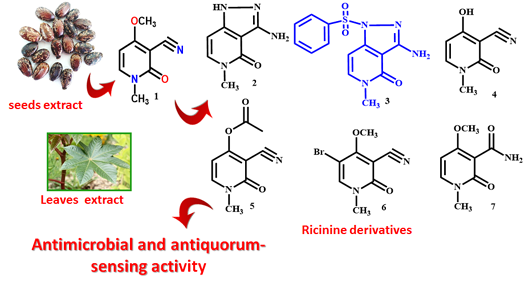Ricinine (1), a known major alkaloid in Ricinus communis plant, was used as a starting compound for the synthesis of six ricinine derivatives; two new and four known compounds. The new derivatives; 3-amino-5-methyl-1H-pyrazolo[4,3-c]pyridin-4(5H)-one (2), and 3-amino-5-methyl-1-(phenylsulfonyl)-1H-pyrazolo[4,3-c]pyridin-4(5H)-one (3), as well as the previously prepared derivatives (4-7) were subjected for antimicrobial and antiquorum-sensing evaluation in comparison to different R. communis extracts. Acetyl ricininic acid derivative (5) showed the highest antimicrobial activity among all tested derivatives against Staphylococcus aureus, Escherichia coli, Klebsiella pneumoniae, Pseudomonas aeuroginosa and Candida albicans. However, compound 7 (4-methoxy-1-methyl-2-oxo-1,2-dihydropyridine-3-carboxamide) showed the highest antiquorum-sensing activity among all tested compounds and extracts. These findings proved the usefulness of ricinine as a good scaffold for the synthesis of new antimicrobial and antiquorum-sensing derivatives in spite of its poor contribution to the antimicrobial activity of the plant extracts.


